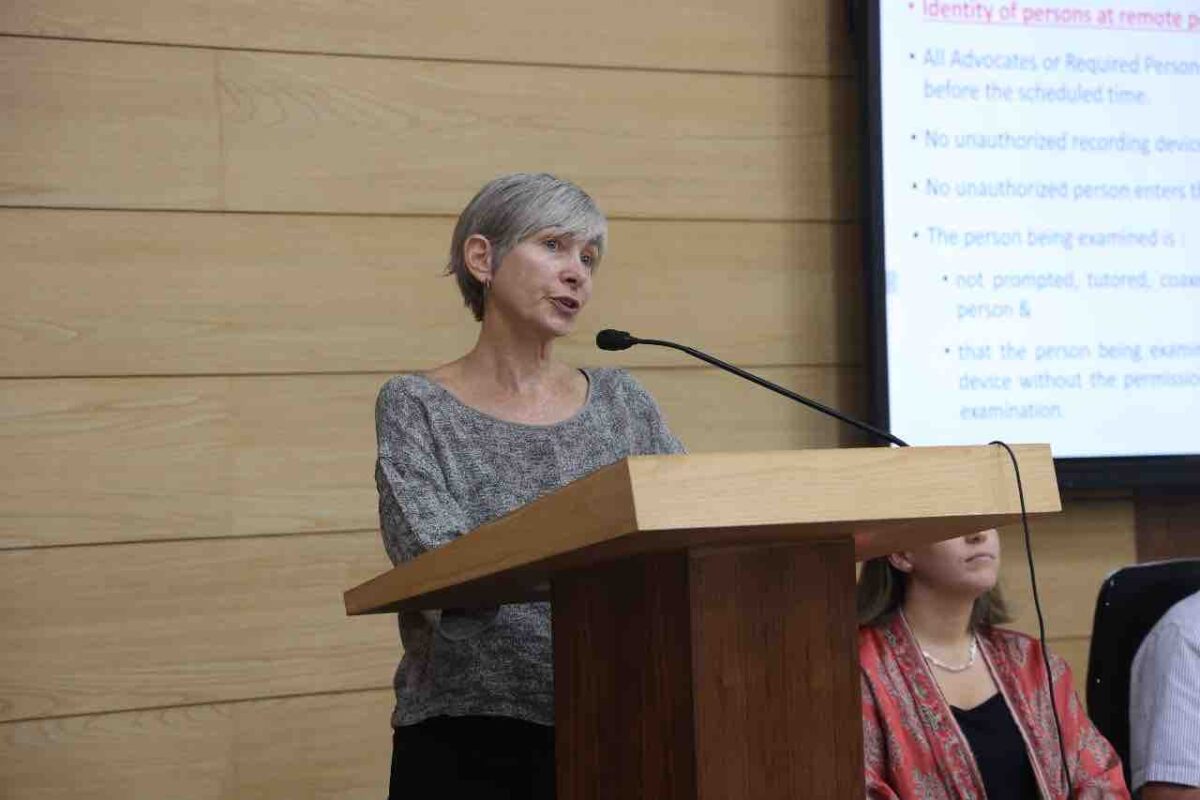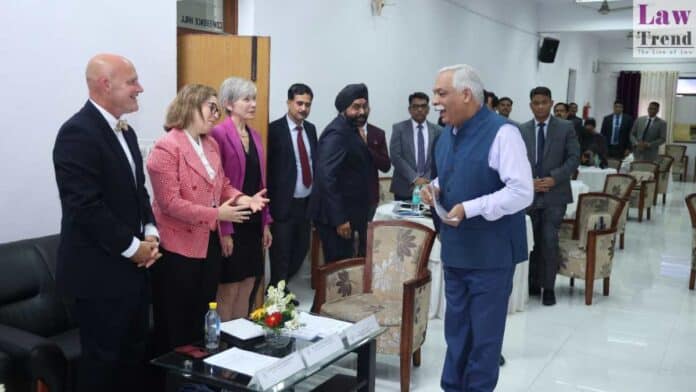Under the aegis of National Judicial Academy, Bhopal, two days workshop was organized by the Federal Judicial Centre, Washington D.C. and Central and East European Law Initiative (CEELI) Institute, Prague, the Czech Republic on July 8 & 9, 2023 at Judicial Training & Research Institute, UP, Vineet Khand, Gomti Nagar, Lucknow. This workshop is the second workshop for District & Sessions Court Judges on ‘Adjudication of Terrorism Cases’, the first was held at Maharashtra Judicial Academy in the month of March, 2023.
The major objectives of this workshop are to impart training and sensitize 22 participants from across the country on the best practices relating to adjudication of terrorism cases. The other objectives include discussion on important aspects of a trial to be conducted by special judges dealing with terrorism cases. The workshop agenda included discussion on fair trial rights in terrorism cases, anti-terror legislation, framing of charges in terrorism cases, national security and management of confidential information, decoding the binary of digital evidence, appreciation of evidence in terrorism cases, case management, security to stakeholders and trans-national issues in terrorism cases. The workshop also had a short reflection on impact assessment of the programme.

On Saturday, July 08, 2023, the programme commenced at 09.30 A.M., the programme was inaugurated by Hon’ble Mr. Justice Devendra Kumar Upadhyaya, Senior Judge, Allahabad High Court at Lucknow and Chairperson, Supervisory Committee, JTRI. His Lordship emphasized in his opening address that –
“the terrorists not only endanger the ideals of democracy and independence but also pose a serious challenge to humanity’s existence, prosperity and growth. As such, stringent protection is needed to prevent terrorism.
His Lordship stressed on the international nature of terrorism and said that the knowledge of international public law is crucial for understanding the legal framework for counter-terrorism activities. One lesson that can be learnt from looking at the framework of international law relating to terrorism is that it has a complex and interlocking structure and there should be advanced vigilance apparatuses such as CCTV camera, checking by metal detectors, tapping of phones, screening of computer, physical movement etc. installed at sensitive locations/ installations. He said that a well trained investigation officer, Public Prosecutor and a Special Judge may together ensure fair, effective and quick justice to all the stakeholders affected by this dangerous global menace.”
He extended gratitude to Hon’ble Mr. Justice A.P. Sahi, Director, National Judicial Academy, Bhopal for offering the opportunity to host this second workshop in U.P. at JTRI, Lucknow.
Hon’ble Mr. Justice Om Prakash Shukla, Judge, Allahabad High Court at Lucknow and Member, Supervisory Committee, JTRI addressed and stressed on the need to take strict actions to combat terrorism in the broader context. He referred to the United Nations Security Council Resolution 1456 (2003) which says that the States must ensure that any measure taken to combat terrorism comply with all their obligations under international law, and should adopt such measures in accordance with international law, in particular international human rights, refugee, and humanitarian law.
His Lordship said that adjudicating terrorism cases is an onerous responsibility on special judges dealing with these cases. The trial court judge has to balance the rights of accused on the one side and those of the victims and society on the other. Moreover, the trial judge cannot overlook the national and global security concerns while conducting such trials.
On this occasion, Sri Vinod Singh Rawat, Director, JTRI, Judge Jonathan Hawley, U.S. Federal Magistrate Judge, Illinois Central District Court, Guevara Maria of CEELI Institute, Prague, Mira Gur-Arie of F.J.C. Washington D.C. and Ms. Shruti Jane Eusebius, NJA Observer, and seven Master Trainers were present. The introductory session was compered by Dr. Humayun Rasheed Khan, Additional Director (Research), JTRI
The Master Trainers for the workshop were Mr. D. Lingeswaran, District Judge, Chennai, Tamil Nadu, Ms. Garima Sharma, Additional Director, Chhattisgarh, State Judicial Academy, Bilaspur, Sri Ankur Gupta, Additional District & Sessions Judge, Muzaffarpur, Dr. Humayun Rasheed Khan, Additional Director (Research), JTRI, Dr. S.S. Reddy, Additional Chief Judge, City Civil Court, Hyderabad, Telengana State, Smt. Madhu Khanna Lalli, Additional District & Sessions Judge, Chandigarh Judicial Academy, Chandigarh and Sri Manmeet Singh Suri, Additional Director (Training), JTRI, U.P., Lucknow.
On first day, in the technical sessions, the master trainers highlighted various vital issues involved in adjudication of terrorism cases.
In the first session, Dr. Humayun Rasheed Khan, Additional Director (Research), JTRI focused on the important components of Fair Trial Rights in Terrorism Cases such as presumption of innocence, right to adequate legal assistance, free legal aid and right to appeal etc.. In this session participants were actively engaged through discussions on hypothetical problem exploring the different contours of fair trial rights in terrorism cases.
In the second session, Mr. D. Lingeswaran, First Additional District & Sessions Judge, (TADA), Chennai, Tamil Nadu, focused on the topic ‘Anti-Terror Legislations: Evolution and Judicial Interpretation of the Substantive Provisions’ and said that the trained judges is one of the best practices suggested by the Hague Memorandum. It was also focused on the evolution of Anti-Terror Laws in India, particularly since the mid 1980’s. It was said that look into the interpretation of certain provisions of the Anti-Terror Laws on important aspects by Hon’ble Court at various stages of the trial. Important judgments of Hon’ble Apex Court were also discussed. The third technical session was devoted to framing of charges in terrorism cases.
In the fourth session, Mrs. Garima Sharma, Additional Director, Chhattisgarh, State Judicial Academy, Bilaspur discussed National Security and Management of Confidential Information and also explored the meaning of ‘classified information in terrorism cases’ and reviewed best practices for managing classified information while balancing the rights of accused.
On the first day, in the last session, Sri Ankur Gupta, Additional District & Sessions Judge, Muzaffarpur discussed the issue of ‘decoding the binary of digital evidence’ and said that digital footprints are our second identity. We are leaving them everywhere and all the time. And so are the criminals. This has become a boon for investigating agencies. He also said that this topic seeks to clear the mist on two most vital aspects of digital evidence: their admissibility and reliability.
The first day’s sessions were wrapped by Dr. Humayun Rasheed Khan, Additional Director (Research), JTRI.
Day – 2:
On second day started with a talk on ‘Thoughts, Questions?’ by Dr. Humayun Rasheed Khan, Additional Director (Research), JTRI/Master Trainer. Mr. Ankur Gupta, ADJ, Muzaffarpur discussed the subject ‘Appreciation of Evidence in Terrorism Cases’ and said that terror cases can have many accused persons and an equally large number of witnesses. In this session participating judges engaged by drawing upon their vast experience as trial court judges and exchange views and ideas with them for the effective conduct of the evidence, with specific reference to the stage of prosecution evidence.
The second session was taken by Dr. S.S. Reddy, Additional Chief Judge, City Civil Court, Hyderabad, Telangana State, on the topic ‘case management’ where he discussed that case and court room management ensure that trial procedure in courts is fair, accessible, and efficient. It examined the intricacies and nuances of managing terrorism cases.
The session on ‘Providing Security to Stakeholders’ was taken up by Mrs. Madhu Khanna Lalli, Additional District & Sessions Judge, Chandigarh Judicial Academy, Chandigarh and it was discussed that safety starts with you. “It does not come instantly – you should implement it consistently. It identified the risks and vulnerabilities, assess the resources and learn how to implement the control”.
The topic ‘Transnational Issues in Terrorism Cases’ was taken up by Sri Manmeet Singh Suri, Additional Director (Training), JTRI, U.P., Lucknow who reviewed the law and procedure of mutual legal assistance, including coordination between the investigative agencies of different countries, MLATs, letters rogatory, and the process for securing testimony from witnesses located abroad.
Special Invitee and Guest Speaker, Sri Naveen Arora, IPS, ADG, ATS, Uttar Pradesh was invited to enlighten the participants on the subject titled “Fine points of investigation in terrorism cases useful for the adjudication process”. Sri Arora discussed the issues of gathering information and practical challenges in terrorism cases before an investigation officer.
The last session was devoted to ‘wrap-up and Impact Assessment’ by Dr. Humayun Rasheed Khan, Additional Director (Research), JTRI.
In the end, the Director of the Institute Sri Vinod Singh Rawat expressed vote of thanks.



